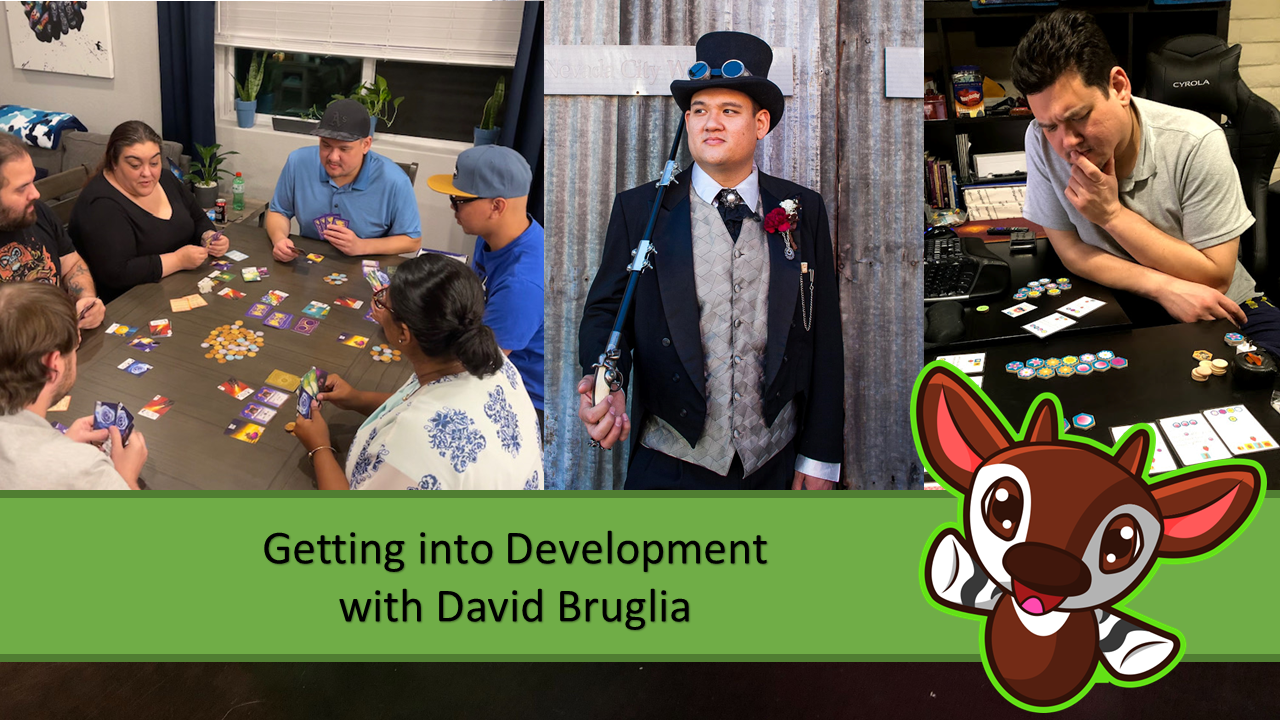
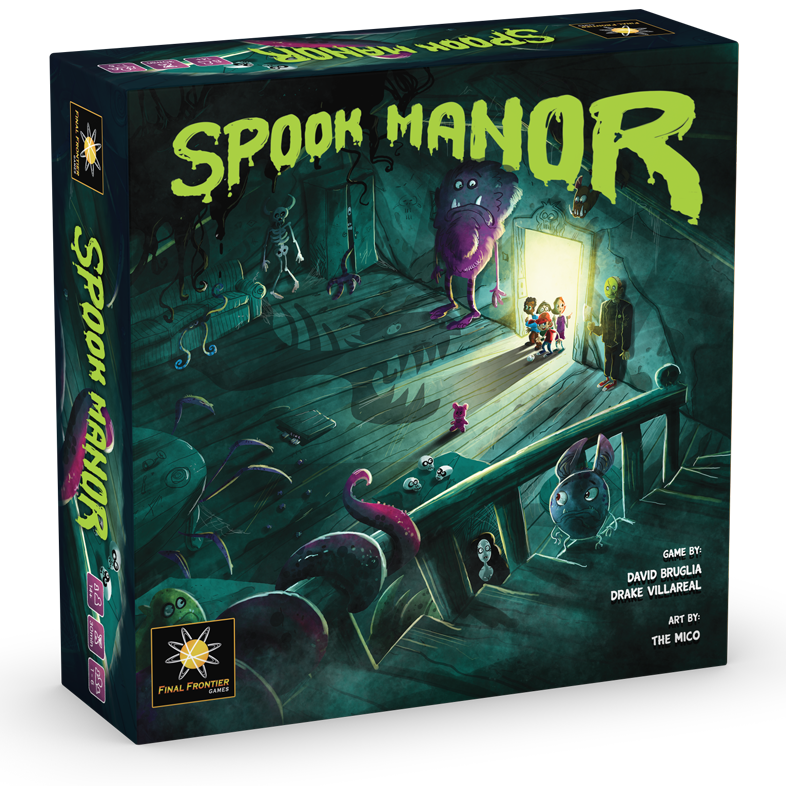
David Bruglia is the designer of Spook Manor, Project Pacific, and Scents & Sensibility, and he’s developed Wicked & Wise and Fire in the Library: The Card Game.
First of all, tell us a bit about yourself! How did you get into designing and later on, developing, board games?
I was actually into video game design before board game design. I worked on a few projects with friends here and there and attended a couple of game jams. I did most of my level and world building in the Unity engine. I loved being creative, but I hated learning how to code.
Luckily for me, I reconnected with a friend from college at work one day and she invited me to some of their weekly board game lunches. I soon learned that her and her husband also designed their own games. As we started to hang out a little more, I started to playtest their designs and even helped them ship off a Kickstarter (I’m not sure why, but I had a REALLY good time packing a bunch of figurines into boxes for hours on end). Seeing their creation come to life and get shipped off to people really started my interest in board game design (Thank you Sarah and Will!).
After I started designing games, I found out that there were local board game conventions and protospiels in our area. I quickly learned that I LOVED going to conventions. Shortly after that, I heard about a larger convention called Origins and in 2018, I decided to attend for the first time. Being there felt electric! I loved seeing all of the excited attendees and all of the publishers showing off their games. One publisher, in particular, stood out because of the funny looking giraffe they had for a mascot. Fast forward almost a year later, and that same publisher asked if anyone wanted to come hang out and demo games in their booth at Origins 2019. I jumped at the opportunity! Before I knew it, I was in the Weird Giraffe Games booth, teaching attendees how to play Fire in the Library, and it was amazing! I finally felt like I was a part of something that I’ve always wanted, without knowing that I wanted it.
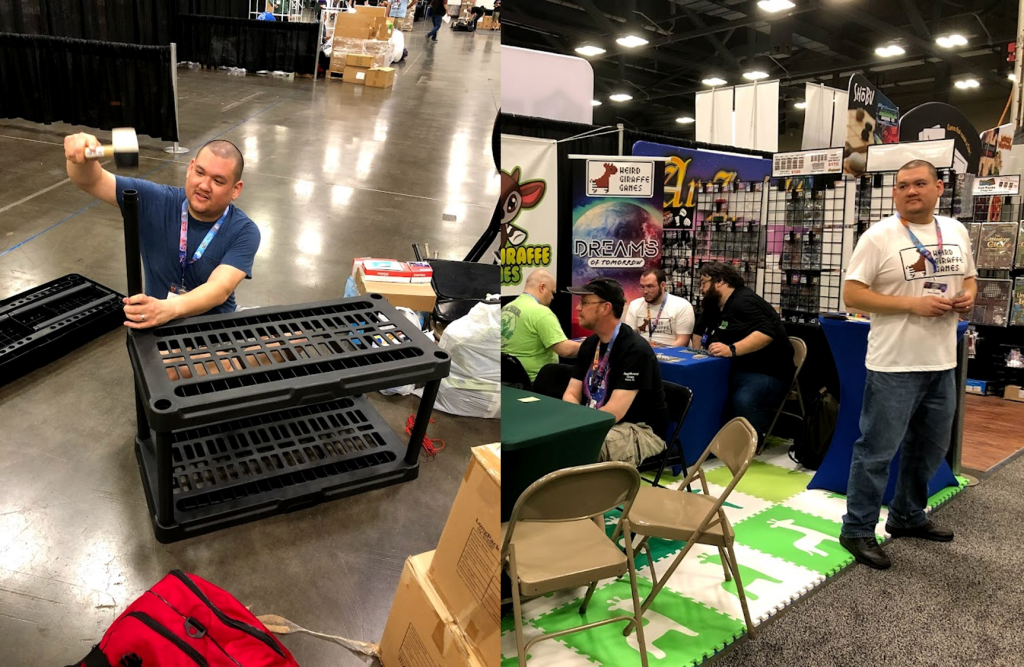
I spent more and more time talking to Carla and playtesting, providing feedback for upcoming products from Weird Giraffe Games.
After the pandemic hit and almost everything went online, I started assisting Weird Giraffe Games in a more official capacity. Then finally, in December 2020, I was offered my first official development role with Wicked & Wise, and I couldn’t be happier (Thank you, Carla!).
Wicked & Wise was the first game that you’ve been a developer on. How did you feel about the process?
The process was a lot different than just being a designer. It was very interesting and challenging (in a good way!) to work on a game from the “other side.” It quickly became apparent that this wasn’t just co-designing another game and that there were going to be a lot more questions to answer and decisions to make.
Was there any part of the development process that was unexpected for you?
Getting into a lot of the minute details was just something I was not used to doing as a designer, where I’m usually just simply trying to figure if something feels good. With design you’re combining a collection of ideas that work relatively well together. But, when we go to development, those ideas get picked apart:
- Why do they work well together?
- Could it be better/more interesting?
- Can we do the same thing with less/smaller/different components?
- How would people normally react in this situation or what kind of person would make the opposite decision in this situation?
Development raises a lot of questions that I was not used to answering.
What was the most important thing you learned about the development process during your work on Wicked and Wise?
Considering how much certain things cost (in both dollars and time) was a good lesson to learn. It’s easier for me to design without constraints, but when it comes to development, you start to realize the importance of cost effectiveness. Things like does this need to be plastic, can it be chipboard? Should we spend time figuring out a way for the game to play with more players or even a solo mode?
What would you do differently on the next game you develop?
I treated development the same way I treated design, in that whenever I had free time, I would work on tasks, playtest, make suggestions, etc. But there are a lot of opportunities to get better on the development side. I can always be better organized. Playing more games is helpful and provides a lot of different examples to draw from. As a personal goal, I’d give myself tighter deadlines and make sure I communicate better because I want to be perceived as professionally as possible, while still having fun and making games.
What did you like most about the Wicked & Wise development process?
The development process felt very diplomatic. I never felt like any of my ideas were ignored and it was a pleasant experience to work with the other developers. Statements of, “Hey, what if we tried this?” were met with “Okay, that sounds interesting, we’ll try it on the next playtest.” Versus, “No, I don’t think that will work and we won’t try it.”
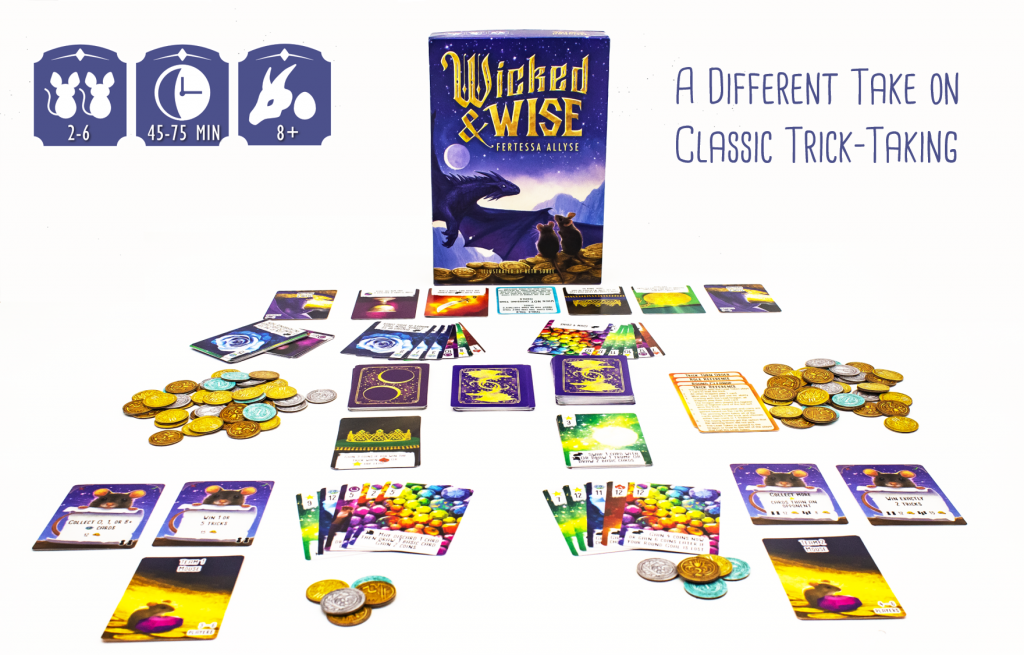
What was the hardest part about developing Wicked & Wise?
The pandemic certainly didn’t help with playtesting. It’s hard for me to playtest online and the options to playtest in person were very limited. Further, there are a lot of people who’ve never played a trick-taking game before, so having to make sure they understand how that works was another challenge as well.

Wicked & Wise had three developers at one point! What did you learn about working with multiple people on the same project? Any tips on working with a number of people on a project?
Respecting everyone’s opinions and suggestions is key. If no one feels unheard, then I feel like there’s a higher chance that we’re all having fun, even while wracking our brains around how to fix some new issue that popped up. Communication is also very important; Everyone is going to have different ideas, so if I have a strong opinion about why something shouldn’t be working a certain way, I explain why and possibly suggest alternatives to try.
What was the best part about working with Fertessa Allyse?
As far as development goes, Fertessa considers all suggestions, makes great decisions and provides very clear feedback. It never really felt like work when Fertessa and I would get together to playtest.
Further, Fertessa is an absolute delight of a human being and is very wise (but sometimes wicked, if she’s on the other team!) It is so much easier to get things done when working with such a pleasant personality.
What do you prefer about being a game developer?
Being a game developer makes me feel more like I’m creating a final product. Someone else has brought the blueprints, and another has brought the materials, but I’m the one putting it altogether and making sure it works. There’s a different sense of pride that comes with development.
What do you prefer about being a game designer?
Being a game designer showcases my creativity just a little bit more. It also feels more carefree and less restrictive. I can move freely between projects sometimes, working on whichever one inspires me at any moment. Games in the design phase seem to have a lot more flexibility that makes them a tiny bit less stressful to work on. If I want to change the theme of the game from birds to cows, and the mechanic from bidding to bluffing, it’s much easier to do that at this stage (also, now I have two games!).
Has being a game developer changed anything about the way you design games?
Yes, I feel like my designs will be just a tad more grounded or at the very least, give me pause when considering decisions that might not be feasible when it comes time to develop the final product. Before developing, I might have thought that it was fine if every single card in a game was explained in a reference book versus just making sure that the information on cards are concise and clear enough to forego a reference book, in most cases. I feel like I can pay more attention the user experience while designing games and can balance better between complexity and clarity.
What are your favorite games to design?
I enjoy strategy coupled with randomness. I like when people are rewarded for figuring out paths to victory and receive the knowledge of what has the highest chance to succeed, instead of having a victory guaranteed. And throw in a couple things to mitigate the randomness, for good measure.
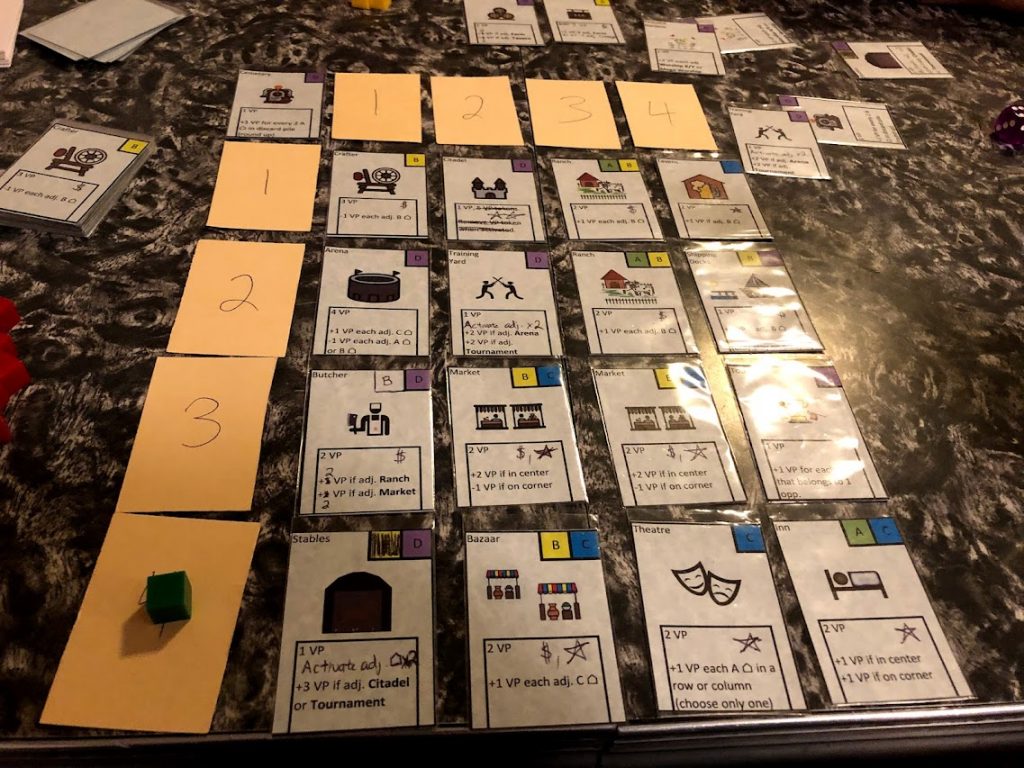
How do you usually start designing games?
Ideas will usually just come randomly through conversation with others or while playing games. What I enjoy doing when that happens is drawing everything out on big piece of paper that covers the table. I’ll draw where someone holds their resources, a play area, and even actions (drawing/discarding cards, moving pieces, flipping coins). This process helps me get a big picture view that I can refer to, repeatedly.
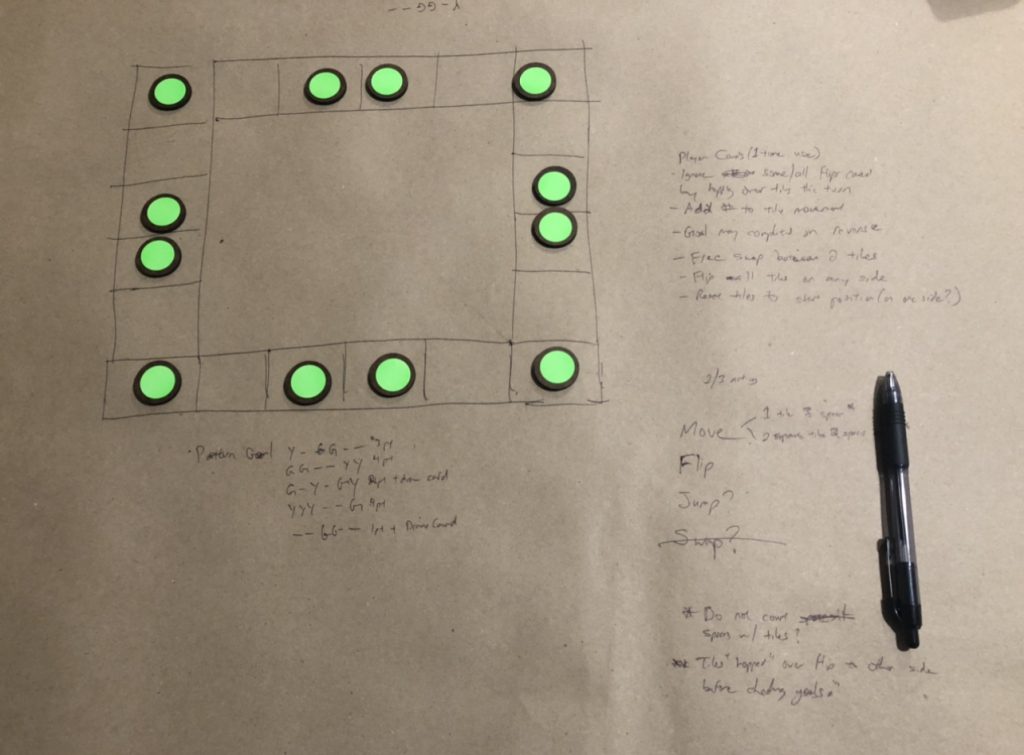
How do you start developing a game?
This largely depends on what state the game is in when development starts. I like to start with a list of some basic questions that I keep in mind while playing through a couple of times. Some good questions are: Is it fun? What works well? Is anything broken?
Next, I work on addressing those questions. If it’s not fun because the theme/mechanics don’t work well together, can I do some research to see what could work better? If the overall game works well, identify the core of what works well and use that as a sort of base for making decisions. If something is broken, how can we change it to work better (or maybe we just need to ditch what isn’t working)?
What’s your least favorite part of the development process?
I don’t have much development experiences just yet, so I don’t really have a personal answer for this. I could see situations where a developer feels like the decisions they can make are very limited due to publisher constraints. Thankfully that hasn’t happened, yet. However, I know that not every project is going to be smooth sailing and working on a lot of game design/development overall, is going to help mitigate these situations.
What are you particularly good at as a game developer?
I think I’m good at estimating what feels good/right when it comes to balance/fun. I know that playtesting or mathematical simulations will reveal what works best, but I can usually find a good starting point for whatever goal we are working towards: “Hey, let’s try it with these cubes worth 2 victory points, and 3 actions in a round. And the odds of drawing the skull card is roughly 5 percent, so let’s set that a little higher for harder difficulties.”
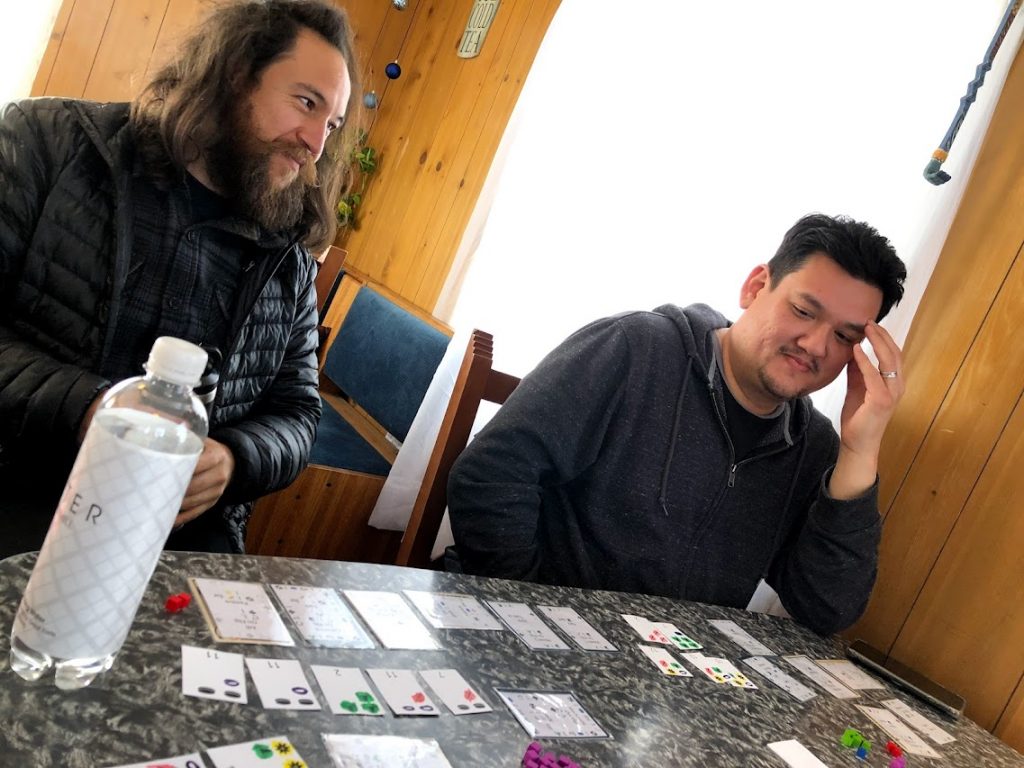
Is there anything you’d like to improve on as a game designer or developer?
There are a lot of things on the statistical side that I’d love to be just second nature to me. I’d love to be able to easily recognize situations like what paths to victory remain in any given stage of a game, and what the opportunity cost is for each of those paths. I’ve listened to other designers talk about things like this and it astounds me!
I also feel like I’ve played a lot less games than other designers and developers, and I know that it would help to be able to draw from more examples when making decisions.
Any advice for people that are looking to become better at developing?
I think a really fun way to get better at developing is to have a group of friends each design their own game. Then, at some point, switch and develop each other’s designs. This will give you practice working on something with no prior knowledge. You can even set specific constraints for each other (small footprint, dice and cubes only, circle-shaped cards). For hard mode, switch designs again at some point.
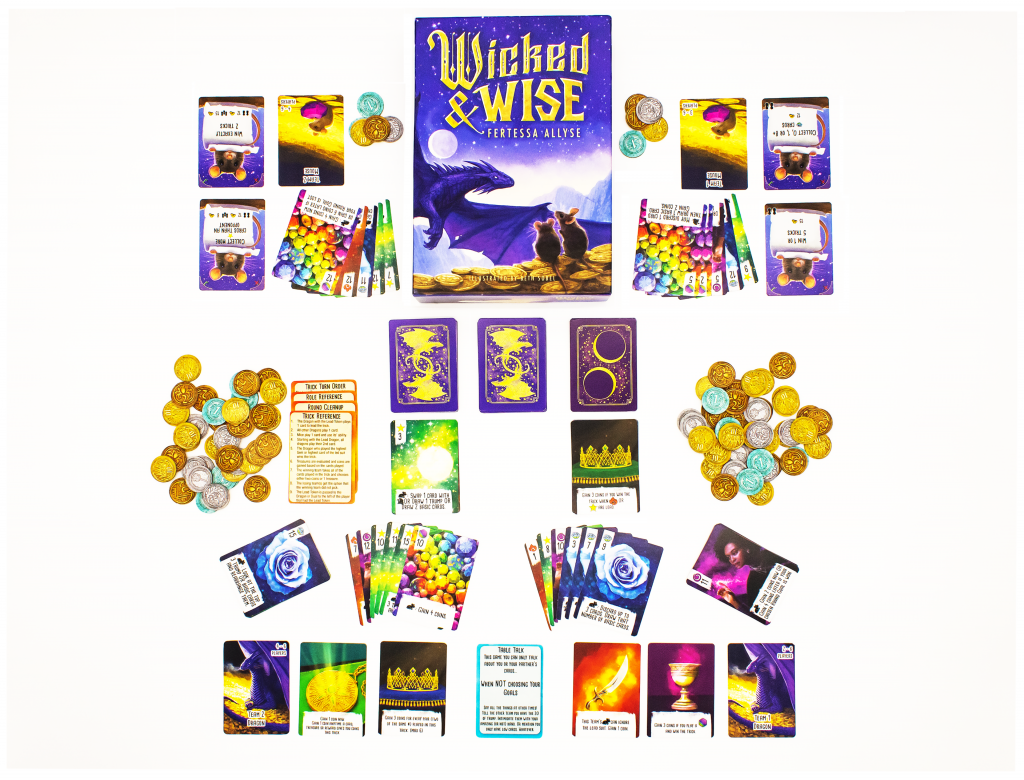
Wicked & Wise is currently on Kickstarter now! You can check out the campaign here: http://weirdgiraffegames.com/WW25
You can also preorder Spook Manor here: https://final-frontier-games.myshopify.com/products/spook-manor-pre-order
Did you enjoy this entry? Do you think you’d like being a game designer or developer more? Please let me know! I’d love to hear what you think and what kind of things you’d like to see from this blog. Feel free to send me an email or comment with your thoughts!
Don’t forget to sign up for my mailing list, so you don’t miss a post: https://tinyletter.com/carlakopp
Do you ever start with a list of essential experiences to a game that you can refer back to when making design decisions?
I generally have a list of requirements that I refer back to when making design decisions and part of that is the experience. Is the game friendly? How does player interaction feel? Should gameplay ever evoke any emotions? What different factors influence player decisions?
I think all together, it gives the overall experience I want the players to have, but I don’t explicitly have a list of essential experiences, if that makes sense!